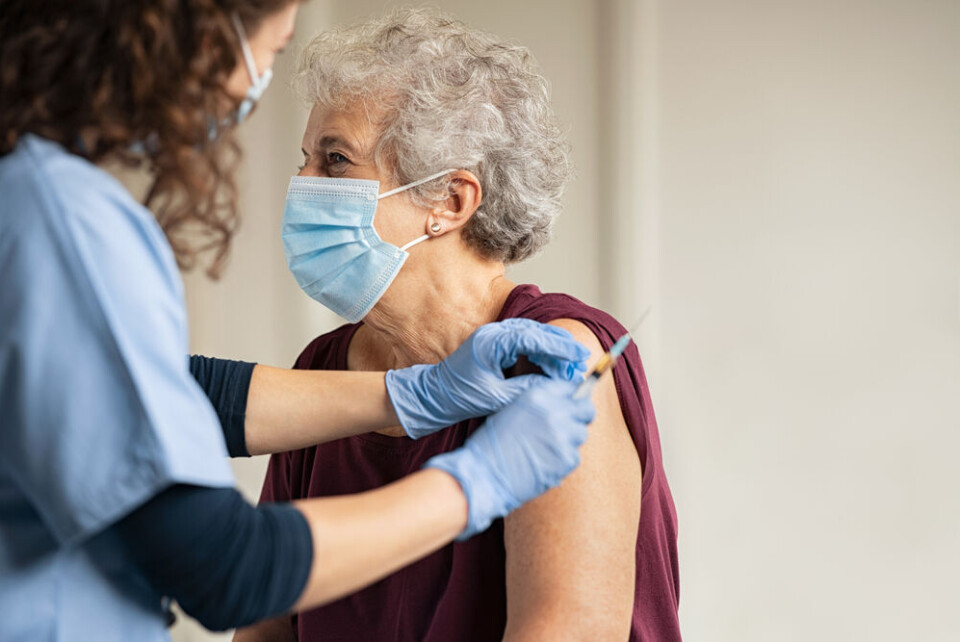-
Free fraud service for UK homeowners living in France
Owners are encouraged to sign up for a free monitoring service from HM Land Registry to reduce risk
-
New civic tests for foreigners in France launch amid criticism
Applicants for some types of residency cards must now take 45-minute test
-
Workers in France can take 17-day break using only eight days of leave in 2026
Favourable calendar for public holidays makes extended May break possible, with five guaranteed long weekends throughout year
Eligibility, flu jab: What to expect from France’s new Covid campaign
The date for the autumn booster vaccinations has been brought forward as cases continue to rise

The new booster campaign for Covid vaccinations begins in France next week, as cases rise definitively across the country. Here is who is eligible and how it will work.
The new ‘autumn’ campaign is set to begin on October 2.
It had been scheduled to start on October 17, but Health Minister Aurélien Rousseau brought it forward by two weeks due to the rising number of cases across France, after taking advice from the health risk committee Comité de veille et d’anticipation des risques sanitaires (COVARS).
Read more: France moves Covid booster date forward: what does the data show?
Who can get the vaccination booster?
People who are at risk of serious illness if they become infected by Covid are eligible for a booster and encouraged to have one as soon as possible.
Health authority the Haute Autorité de Santé (HAS) recommends that this includes:
- People aged 65 and over
- People with comorbidities, including infants aged 6 months and over, children, teenagers, and adults
- Immunocompromised individuals
- Pregnant women
- Residents of elderly care homes (Ehpad) and long-term care units (USLD)
- People at very high risk of developing a severe form of the disease, with advice from their healthcare team
- People who are in regular contact with vulnerable individuals.
The HAS also recommends a booster for:
- Students and professionals in the health sector
- Students and professionals in the fire and rescue services
- Professionals in regular contact with immunocompromised or vulnerable people
However, it must be noted that even if you are not part of the target groups above, you can still receive a booster dose free of charge.
Are there any extra eligibility criteria?
Yes. You must wait:
-
At least three months after having your last Covid vaccine, if you are in a vulnerable group
-
At least six months since your last Covid vaccine or confirmed infection for everyone else
Where can I get a vaccination?
You can get one at:
- Your doctor’s surgery (general practitioner or specialist),
- A pharmacy
- A nurse's surgery
- A midwife's surgery
Some may be able to arrange for a vaccination to be given at home. These include the very vulnerable or residents of an elderly care home or long-term care unit. For full details of vaccination centres are available on the Sante.fr website.
What vaccines will I receive?
This campaign will mainly use vaccines that are designed to target the XBB.1.5 strain of the virus, and other newer variants. This strain is another Omicron variant.
The Ministry of Health has said that these adapted vaccines also reduce the risk of hospitalisation due to infection of any strains.
This includes a new Pfizer mRNA vaccine, which has been available since the start of September for adults and infants.
People who cannot receive this vaccine for health reasons will be given alternatives including VidPrevtyn Beta from French lab Sanofi, and the Nuvaxovid booster vaccines from US company Novavax, said the Assurance-maladie website. Novavax is set to release its Nuvaxovid vaccine adapted to the XBB.1.5 strain, in November.
The vaccines are designed to target the substrains EG.5.1 (Eris) and BA.2.86 (Pirola), which have both been spreading across the country.
Read also: Eris: New, more contagious variant sparks Covid escalation in France
Can I get a flu vaccine as well?
Yes, from October 17 onwards, people who are receiving a Covid booster vaccine can also have their annual flu vaccine given at the same appointment if they wish. However, the injections must be given in two separate areas of the body (for example, one in each arm rather than the same arm).
The flu vaccination campaign will only begin on October 17, so no flu vaccines will be available before then, even if you have your Covid vaccination before.
How much does the vaccine cost?
The vaccination is 100% covered for everyone who is eligible for state healthcare. You do not need to pay upfront.
Cases rising in France: ‘Vigilance’ needed
It comes as Covid cases are definitively rising across France.
At-home medical consultation service SOS Médecins reported a 17% rise in suspected Covid cases in its latest Santé Publique France update. It recorded 4,067 cases from September 4 to 11, up from 3,488 between August 28 and September 3 (latest data available).
GPs have also reported rising consultations related to Covid, of around 15% over the same period, via the doctors’ network Sentinelles.
Hospital figures are also up. The number of A&E admissions for suspected Covid rose by 30% from September 4 to 11, with 3,651 nationwide; up from 2,815 for the week of August 28 to September 3.
Authorities have admitted that it is difficult to track the spread of the virus currently, as most of the regular testing and tracking methods are no longer being used or updated.
However, virus expert Yannick Simonin told newspaper Libération that “despite this fairly marked increase, we're not reaching the levels of the first waves. We're not in a ‘worrying’ phase with an uncontrolled resumption of the epidemic, but rather a ‘vigilance’ phase,” he said.
Read also
Five questions on France’s new Covid vaccination campaign
I have had Covid-19. Can I still get vaccine in France?
























